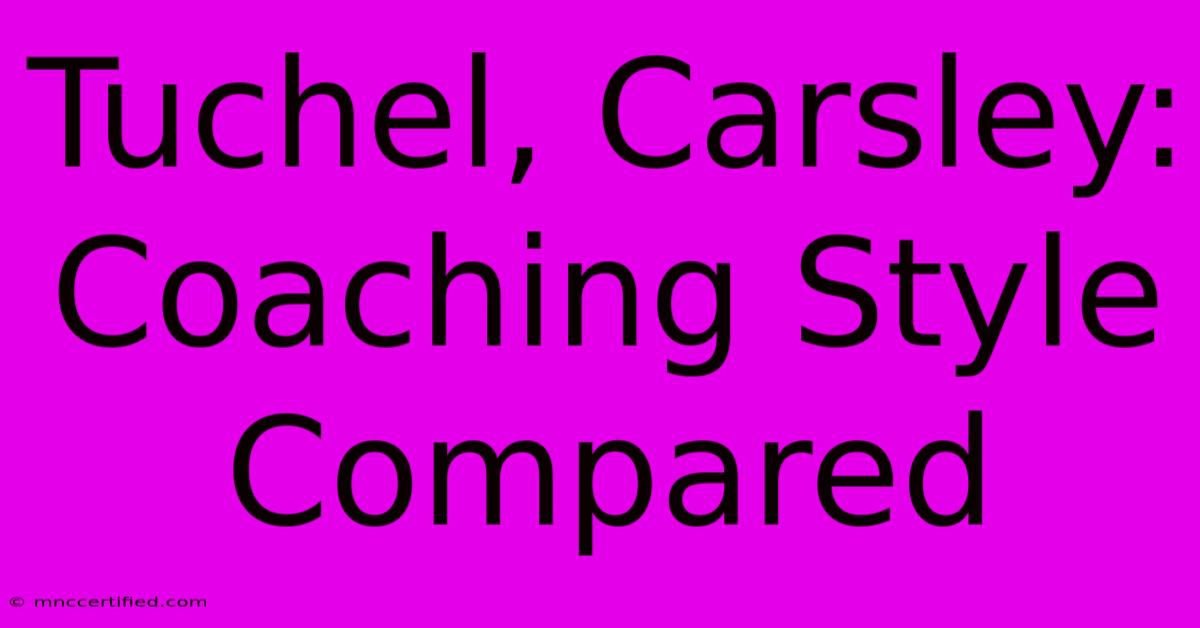Tuchel, Carsley: Coaching Style Compared

Table of Contents
Tuchel vs. Carsley: A Coaching Style Showdown
The football world is rife with contrasting managerial styles. While some favor a meticulous, possession-based approach, others thrive on high-pressing intensity. Today, we delve into a fascinating comparison: the coaching styles of Thomas Tuchel and Sean Carsley. While seemingly disparate in experience and current level, analyzing their approaches reveals intriguing similarities and key differences that offer valuable insights into modern football management.
Thomas Tuchel: The Architect of Control
Thomas Tuchel, a name synonymous with tactical sophistication, has carved a niche for himself in elite football. His coaching philosophy centers around possession-based football, emphasizing intricate passing patterns and strategic positioning to dominate the game.
Key Elements of Tuchel's Style:
-
Tactical Flexibility: Tuchel is renowned for his adaptability. He's not afraid to shift formations mid-game or tailor his approach to exploit opponents' weaknesses. This adaptability, often seen as a hallmark of his success, allows him to maintain control even against vastly different opponents. Think of his usage of a back three, back four, or even a hybrid system depending on the match context.
-
High Pressing Triggers: While not always a high-pressing manager in the Jürgen Klopp mold, Tuchel incorporates pressing intelligently, triggering it based on the opponent's positional play and aiming to win the ball in key areas of the pitch. It's a calculated press, not a relentless one.
-
Emphasis on Individual Skill: While the system is paramount, Tuchel empowers individual players to express their creativity within the defined structure. This blend of tactical discipline and individual brilliance has been a crucial component of his success.
-
Strong Communication: Tuchel is known for his demanding but effective communication with his players. He fosters a culture of high expectations, pushing his squad to constantly improve and adapt.
Sean Carsley: Building from the Ground Up
Sean Carsley, while operating at a different level of the football pyramid, displays a coaching philosophy that shares some surprising similarities with Tuchel's approach. Though his resources and player pool differ drastically, his core principles resonate.
Key Elements of Carsley's Style:
-
Youth Development Focus: Carsley's style emphasizes nurturing young talent. His approach often involves integrating academy players and implementing a development-focused training regime that builds the foundations for long-term success.
-
Organized Defensive Structure: Despite possibly working with less technically gifted players, Carsley prioritizes a well-organized defensive structure to limit opponent's chances. This mirrors Tuchel's focus on control, even if the execution differs.
-
Fluid Offensive System: While his system may be less intricate than Tuchel's, Carsley likely encourages dynamic movement and off-the-ball runs to create opportunities. This aligns with Tuchel's principle of empowering players within a tactical framework.
-
Adaptability within Constraints: Carsley's ability to adapt his tactics based on available players and opponent strengths showcases a similar tactical flexibility to Tuchel, albeit within different constraints.
Tuchel vs. Carsley: A Comparative Overview
| Feature | Tuchel | Carsley |
|---|---|---|
| Level | Elite (Champions League, etc.) | Lower Leagues (likely) |
| Resources | High | Limited |
| Tactical Complexity | High | Moderate |
| Possession Focus | Strong | Moderate (likely, based on resource limitations) |
| Youth Development | Less Emphasis (though he uses young players) | Strong Emphasis |
| Defensive Organization | Strong | Strong (necessity due to likely limited resources) |
Conclusion: Beyond the Level
While separated by levels of competition and resource availability, Tuchel and Carsley's coaching styles exhibit compelling parallels. Both prioritize tactical flexibility, a structured defensive approach, and, importantly, a focus on creating an effective system within their available resources. The difference lies primarily in the scale and complexity of execution. Carsley's success lies in maximizing potential with limited tools, mirroring a smaller-scale version of Tuchel's mastery of elite football. Both exemplify the core principles of effective coaching: adaptability, organization, and the ability to inspire players to perform to their highest potential. Understanding their approaches offers valuable insights into the universal principles that underpin successful football management, regardless of the league.

Thank you for visiting our website wich cover about Tuchel, Carsley: Coaching Style Compared. We hope the information provided has been useful to you. Feel free to contact us if you have any questions or need further assistance. See you next time and dont miss to bookmark.
Featured Posts
-
Seahawks Host Food Drive Nov 24th
Nov 19, 2024
-
Robertsons Scotland Poland Nations League Result
Nov 19, 2024
-
East Texas Under Tornado Watch
Nov 19, 2024
-
Trump Dance Craze Hits The Nfl
Nov 19, 2024
-
Travis Kelces Unique Fashion Fusion
Nov 19, 2024